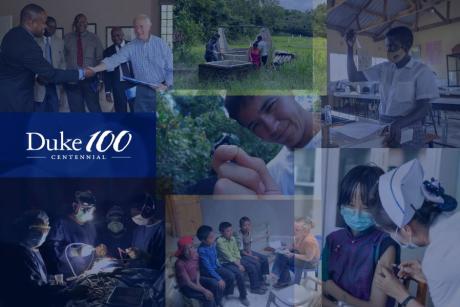In November, 2007, over one hundred people came to Duke to participate in a conference about the shortage of healthcare workers in Africa.
In March, 2008, a team of faculty, staff and students from Duke traveled to Africa to attend another meeting on the same topic. The “First Global Forum on Human Resources for Healthcare” was the inaugural conference of the Global Healthcare Workforce Alliance (GHWA), which is an affiliate of the World Health Organization (WHO). The conference was held in Kampala, Uganda from March 2-7, with approximately 1,500 participants.
“The serious lack of health care workers in low and middle-income countries has finally begun to garner international attention,” says Michael Merson, director of the Duke Global Health Institute. “This was the first large international conference dedicated to this problem, and it issued a strong declaration outlining ways to rectify the problem as quickly as possible.
The Duke team actively participated in the conference. Fuqua faculty member Kevin Schulman, MD participated in the panel discussion in response to a keynote lecture by Rajat Gupta, chair of the board of the Global Fund to Fight AIDS, TB and Malaria, and Duke organized a skills building workshop on “Private Sector Perspectives for Human resources for Health with presenters from the Strathmore Business School in Kenya. In addition, Duke coordinated a breakout session for participants on “Innovative Private Sector Responses to the Health Workforce Shortage.”
“We often hear that Africa has 25 percent of the disease burden of the world, but only 3 percent of the world’s healthworkers,” says Merson. “But the poorest countries often also lack the necessary infrastructures to train and retain these workers or to create health systems to deliver effective and affordable health interventions. Because Duke has a global health institute, strong schools of medicine and nursing, and a vital business school , we were delighted to be asked to bring new ideas and energy to this discussion.”
The Kampala meeting also offered the opportunity for task forces and working groups to gather under the auspices of the GHWA . Following Duke’s very successful conference in November, Francis Omaswa, executive director of the GHWA, asked Duke to serve as the secretariat of a GHWA Technical Working Group (TWG) focused on how the private sector can help alleviate the shortage of healthcare workers in Africa. Merson serves as chair of the TWG secretariat. Jeffrey Moe, of Fuqua School of Business, serves as vice chair of the group. The Kampala meeting offered the first opportunity for this group to meet.
Duke sponsored the attendance of five Duke students at the conference: three first-year medical students and two students from Fuqua’s Health Sector Management program. In addition to participating in the conference, the students were involved in gathering information about private sector program models that are making promising advances to alleviate the shortage of healthcare workers in low- and middle-income countries. They also had inspiring meetings with other students attending the conference and with students from nearby Makerere University, and the opportunity to visit and tour New Mulago Hospital in Kampala.
Gretchen Scheidler, a student at Fuqua, was asked to participate in a panel discussion related to strengthening the pipeline of healthcare professionals. “What was so striking to me was how all 5 of us - a 5th year medical student from Rwanda, a 4th year nursing student from Ghana, a 4th year pharmacy student from Swaziland, a nursing and MPH student from Hopkins, and me, a registered nurse & first-year MBA student in Health Sector Management - are motivated predominantly by the same factors in terms of our career. Upward mobility, ongoing education, keeping all career doors open, and making a difference in the world (and especially in healthcare) were the themes that were continually repeated in the conversation.”
(Read more comments from the students, staff and faculty who attended the meeting on their blog.)
Duke faculty members also took advantage of the trip to East Africa to strengthen other budding relationships with universities and government organizations in Uganda.
“It was a full and very satisfying trip,” says Merson. “We are very excited about the opportunity to strengthen the relationships we already have in Africa, and to build upon them to create new opportunities at the Institute for research, education and service. And the opportunity to include students in this trip was a definite plus: this sort of exposure to global health issues during the formative years of their professional education will no doubt shape their careers.”


